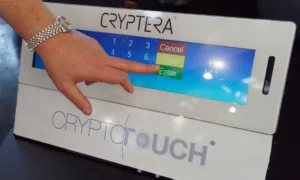Zytronics is a UK-based maker of metal-mesh-based PCap solutions for large touch screens. The company has developed its own ASIC technology that allows it to be very flexible to meet customer requests, especially as it happy to supply customers with small production runs, where a volume chip supplier (e.g. Atmel) would be less able to respond to requests for special support. Zytronics uses copper for the metal mesh on its displays. Although this means that there is some visibility to the mesh, the relatively reliable performance is the most important feature for most of the applications, such as ATMs, that it supports.
At the show, the main news was of the development of a means of detecting pressure, which uses the area of the user’s finger that is on the display. Although this is not as fine or accurate as other methods, the technique can be used to allow “touch to select, press to action” type of operations. This can be important in applications such as ATMs (Zytronics supplies ATM displays to NCR, Diebold and others) where very robust solutions with thick front glass are used. ATM companies would like to move to a fully touch interface rather than touch plus switches, which is the norm in Europe (although fully touch ATMs are accepted in some other regions). Zytronics is able to apply patterns to the glass using a kind of ‘frit’, so they are very robust and the combination of this patterning, with the press feature may be acceptable to ATM makers.
Zytronics has also received certification for the encryption of data entered through a touch pad (PCI). The company believes it is the only touch company with this approval which means that ATM operators are covered if there is some fraud. If PCI encryption is not available, then the operator may have to cover losses in the case of fraud using pin numbers. Zytronics calls this ‘CryptoTouch’ and the technology means that touch systems can be built without a separate Pin Pad for payment.
Zytronics has PCI approval for touch Pin entry. Image:Meko
One of Zytronics’ customers is Diebold, which has introduced a new ATM that includes a new anti-bacterial glass developed by Corning. The new glass uses ion exchange (the technique that Corning uses to make Gorilla Glass) to embed silver ions into the glass surface so that the anti-bacterial effect is long-lasting and cannot be scratched off, as it might for a separate film or coating. The antimicrobial Gorilla glass was launched early in 2015. (Gorilla Glass Targets Automotive and Alternative Applications and Technologies)

